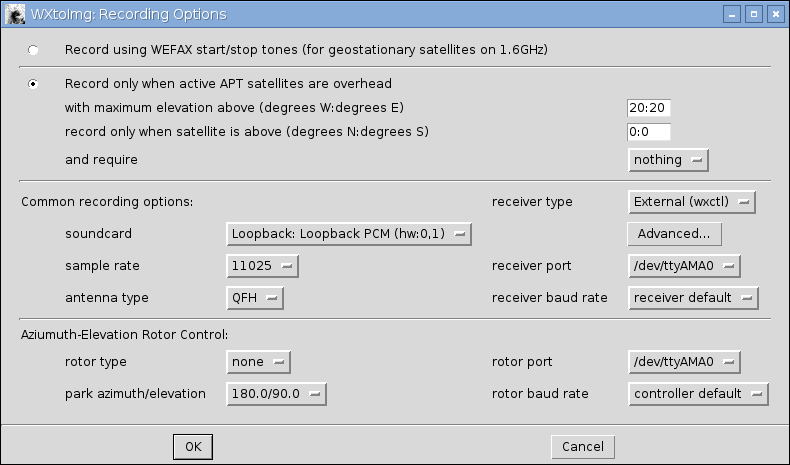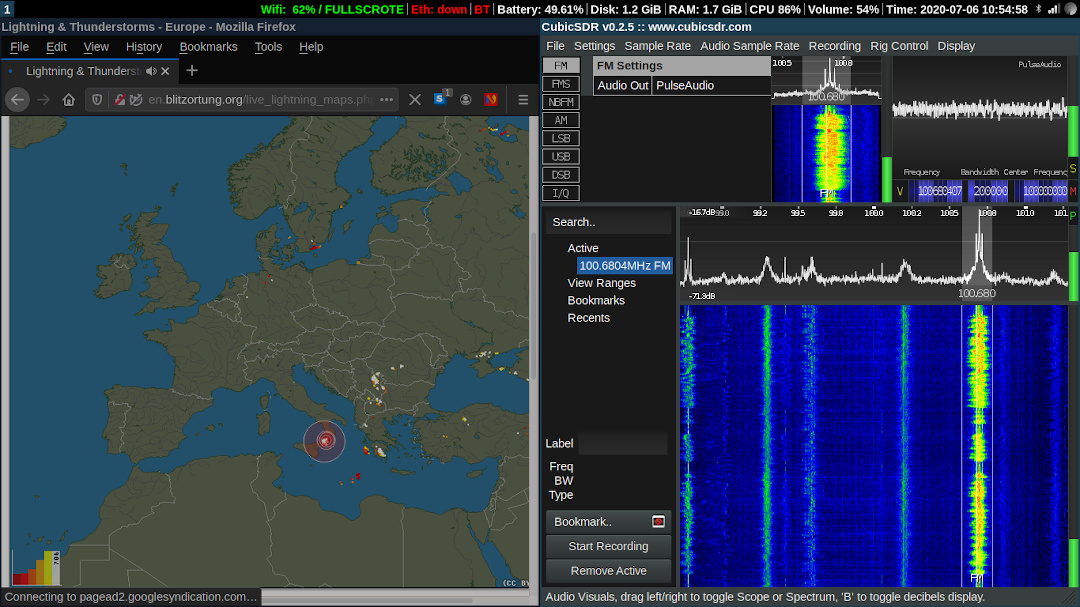

#Wxtoimg error waveinopen failed tv#
Well, settling down for an afternoon of vintage TV fun, I switched the video rack on. I wrote about it here. Please take a moment to read this, if you haven't seen it before. Workshop penny shown for scale.Īnd finally Mrs Doz states the antenna can live on the corner of the shed. The case has an attractive smoked top, which allows me to see the status LEDs. Sadly I didn't notice the Raspberry Pi had moved to an odd angle before the epoxy set :(. The Raspberry Pi, Bias T (getting it's 5 volt supply from the raspberry Pi itself), and the SDR receiver are all mounted up in a small case. Wput -B -u -dont-continue -reupload -tries=5 -binary -verbose -reupload ~/weather/Folder*/*.* Sudo echo "0" > /sys/class/gpio/gpio24/value Sudo echo "1" > /sys/class/gpio/gpio22/value Sudo echo "out" > /sys/class/gpio/gpio22/direction # reads and creates folder with current date / time (i.e 05-30-2019_07-48 *windows friendly*) Receive_and_process.sh now looks like this. Sudo echo "1" > /sys/class/gpio/gpio24/value Sudo echo "out" > /sys/class/gpio/gpio24/direction Schedule_all.sh needs the following lines at the end.

Schedule_all.sh and receive_and_process.sh If (mediaStreamAttributes.TryGetValue (MediaSourceAttributesKeys.To drive the LEDs, there are two bash scripts to alter. Media = NativeMethods.imedia_object_get_media_reffed (demuxer) Throw new ArgumentNullException ("availableMediaStreams") Throw new ArgumentNullException ("mediaStreamAttributes") FIXME: mediaStreamAttributes and availableMediaStreams can be null in SL2 Throw new InvalidOperationException ("demuxer") Throw new InvalidOperationException ("media_element") Throw new InvalidOperationException ("closed") FIXME: wrong/overzealous validations wrt SL2 (see unit tests) Protected void ReportOpenMediaCompleted (IDictionary mediaStreamAttributes, IEnumerable availableMediaStreams) Throw new Exception("Failed to open wav device, error: " + result.ToString() + ".") Int result = waveInOpen(out m_pWavDevHandle,m_pInDevice.Index,format,m_pWaveInProc,0,WavConstants.CALLBACK_FUNCTION) M_pWaveInProc = new waveInProc(this.OnWaveInProc) We must delegate reference, otherwise GC will collect it. WAVEFORMATEX format = new WAVEFORMATEX() įormat.nSamplesPerSec = (uint)samplesPerSec įormat.nAvgBytesPerSec = (uint)(m_SamplesPerSec * (m_Channels * (m_BitsPerSample / 8))) įormat.nBlockAlign = (ushort)m_BlockSize įormat.wBitsPerSample = (ushort)m_BitsPerSample M_BlockSize = m_Channels * (m_BitsPerSample / 8) Throw new ArgumentNullException("device") Public _WaveIn(AudioInDevice device,int samplesPerSec,int bitsPerSample,int channels,int bufferSize) / Is raised when any of the aruments has invalid value. For PCM 8 or 16 are the only valid values. / Sample rate, in samples per second (hertz). _waveHdr = GCHandle.Alloc( header, GCHandldType.Pinned )

Yeah, this sucker's gonna be pinned for the duration. Header.lpNext = 0 // we don't mess with this pointer Header.dwFlags = WHDR_DONE // so it'll get enqueued Header.dwUser = size // hide the real buffer size here Header.dwBufferLength = 0 // set on each call Header.lpData = data // pointer to the data buffer IntPtr data = Marshal.AllocHGlobal( size ) Create audio buffers, including unmanaged data buffers "unable to open the default WAVE device" ) Int status = waveOutOpen( out _waveOutHandle, Wfx.nAvgBytesPerSec = wfx.nBlockAlign * wfx.nSamplesPerSec Wfx.nBlockAlign = 4 // four bytes per frame, see? Throw new ApplicationExcption( "Open while already open" ) / Opens the audio system, enqueues buffers, and otherwise


 0 kommentar(er)
0 kommentar(er)
